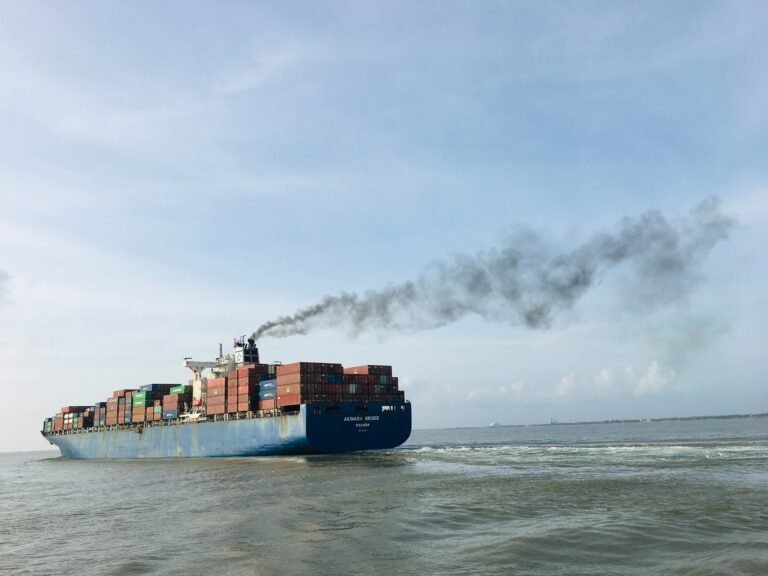NGOs Call for Inclusion of Shipping Emissions in National Climate Plans
Non-governmental organizations (NGOs) Opportunity Green, Seas At Risk, and Transport & Environment have urged states to incorporate shipping emissions in their national climate plans under the Paris Agreement.
This appeal coincides with the gathering of world leaders and maritime stakeholders at the UN’s Oceans Conference (UNOC) in Nice from June 9-13 to discuss measures to enhance ocean protection and sustainability.
Prior to COP30 in Brazil, the integration of shipping in Nationally Determined Contributions (NDCs) would empower countries to address the industry’s emissions through the implementation of new policies and expediting the transition to sustainable energy sources.
Legal analyses support the view that shipping falls within the scope of “economy-wide emission” coverage under the Paris Agreement, highlighting a significant gap in most countries’ climate strategies.
The recent approval of the draft International Maritime Organization’s (IMO) Net-Zero Framework at the 83rd session of the Marine Environment Protection Committee (MEPC 83) is seen as a crucial milestone. The framework, set for adoption in October, will establish a globally binding measure for shipping to impose penalties on greenhouse gas (GHG) emissions within a marine fuels standard, aligning with the IMO’s emission reduction targets outlined in the 2023 Revised Strategy.
While the IMO’s initiative is a significant advancement towards decarbonizing the shipping sector, it falls short of meeting the agreed climate and equity commitments. The NGOs emphasize the need for additional policy actions at national and regional levels to bridge this gap.
By systematically incorporating shipping into NDCs, countries can establish a legislative framework to enforce regulatory measures that mitigate the industry’s substantial climate impact. This approach would offer the necessary confidence and certainty for stakeholders to invest in zero-emission solutions.
“Including maritime shipping in NDCs aligns with UNOC’s broader objectives to accelerate initiatives for ocean conservation and sustainable use,” stated Opportunity Green, Seas at Risk, and T&E.
The NGOs have outlined key recommendations for all nations, urging them to:
- Integrate international shipping emissions into their NDCs to ensure comprehensive coverage of major emission sources;
- Implement policies supporting the IMO’s Net-Zero Framework, including incentives for zero-emission technologies;
- Promote industry innovation through investment in zero-emission fuels and technologies;
- Assist developing countries, particularly Small Island Developing States (SIDS) and Least Developed Countries (LDCs), in meeting new maritime environmental standards.
“For too long, states have neglected their legal obligations to regulate greenhouse gas emissions from international shipping. It’s time to address this gap by including shipping in NDCs and taking meaningful action,” remarked Aoife O’Leary, CEO of Opportunity Green.
“Each year, ships release billions of tonnes of toxic waste into the sea, impacting our food chains. Recognizing shipping emissions in NDCs is crucial for effective climate action,” emphasized Anaïs Rios from Seas At Risk.
“As countries convene in Nice, they must acknowledge their responsibility for shipping emissions. It’s imperative to revise NDCs and price maritime carbon emissions to fulfill international obligations,” highlighted Faig Abbasov from Transport & Environment.
“Governments must take concrete actions to ensure the maritime sector contributes proportionately to climate change mitigation,” concluded the NGOs.
Shipping emissions, accounting for about 3% of global greenhouse gas emissions, are projected to rise by up to 50% by 2050 without intervention. The sector’s growth contributes to the spread of invasive species, harming ecosystems worldwide.
Countries are set to submit their next round of climate action plans (NDCs) outlining strategies to limit global temperature rise as per the Paris Agreement’s objectives. Incorporating ocean-based climate actions in NDCs can significantly boost emission reductions and enhance ambition. While the IMO oversees international shipping emissions, national governments play a crucial role in driving decarbonization efforts domestically.

